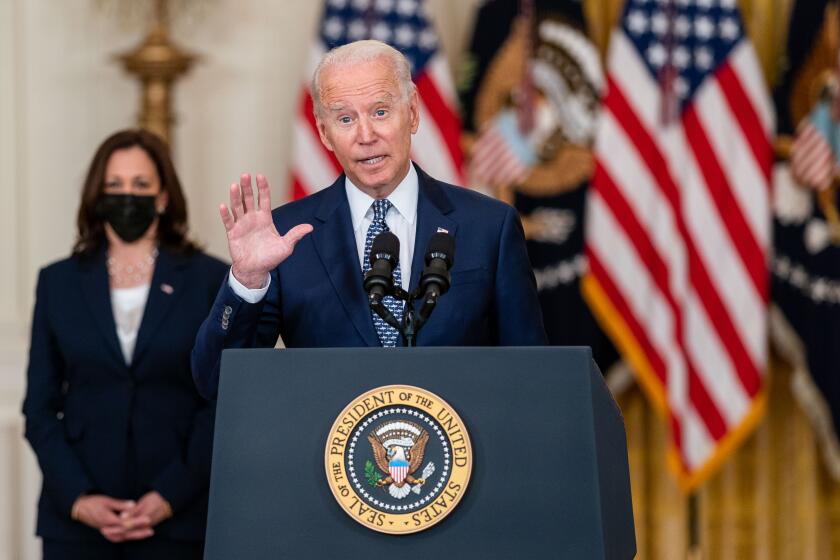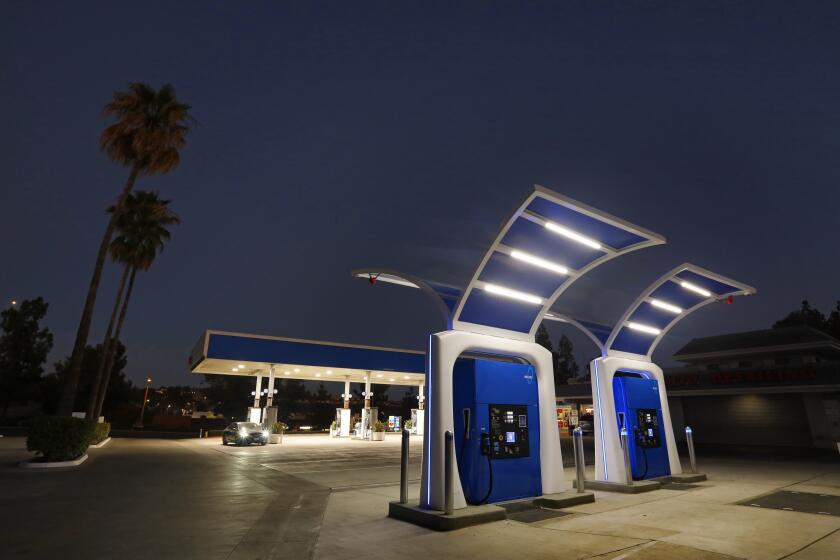Senate approves Democrats’ $3.5-trillion budget blueprint in another win for Biden

- Share via
WASHINGTON — Democrats pushed a $3.5-trillion framework for bolstering family services and health and environmental programs through the Senate early Wednesday, advancing President Biden’s expansive vision for reshaping federal priorities just hours after handing him a triumph on a hefty infrastructure package.
Lawmakers approved Democrats’ budget resolution on a party-line 50-49 vote, a crucial step for a president and party set on training the government’s fiscal might at assisting families, creating jobs and fighting climate change. Higher taxes on the wealthy and corporations would pay for much of the plan.
Passage came despite an avalanche of Republican amendments intended to make their rivals pay a price in next year’s election for control of Congress.
House leaders announced that their chamber would return from summer recess in two weeks to vote on the fiscal blueprint, which would disburse the $3.5 trillion over the next decade. Final congressional approval, which appears certain, would protect a follow-up bill to enact the spending and tax changes from the threat of being killed by a Republican filibuster in the 50-50 Senate.
Even so, passing that follow-up legislation will be dicey: Democratic moderates who are wary of the massive $3.5-trillion price tag are sparring with progressives who demand aggressive action. The party controls the House with just four votes to spare, while the evenly divided Senate is under the party’s control only due to Vice President Kamala Harris’ tie-breaking vote. Solid GOP opposition to the legislation seems guaranteed.
Senate Budget Committee Chairman Bernie Sanders (I-Vt.), once a maverick congressional progressive voice but now a national figure wielding legislative clout, said the measure would help children, families, elderly and working people — and more.
The Senate’s bipartisan infrastructure bill includes funding for water programs in the West and money to help combat wildfires.
“It will also, I hope, restore the faith of the American people in the belief that we can have a government that works for all of us, and not just the few,” he said.
Republicans argued that Democrats’ proposals would waste money, raise economy-wounding taxes, fuel inflation and codify far-left dictates that would harm Americans. They were happy to use Sanders, a self-avowed democratic socialist, to try to tar all Democrats backing the measure.
If Biden and Senate Democrats want to “outsource domestic policy to Chairman Sanders” with a “historically reckless taxing and spending spree,” Republicans lack the votes to stop them, conceded Senate Minority Leader Mitch McConnell (R-Ky.). “But we will debate. We will vote.”
The Senate turned to the budget minutes after it approved Biden’s other major objective: a compromise bundle of transportation, water, broadband and other infrastructure projects costing about $1 trillion in new and old spending. That measure passed 69 to 30, with McConnell among the 19 Republicans backing it. It will need House approval next.
President Biden celebrated the Senate’s bipartisan approval of a $1-trillion infrastructure bill. But his two-track strategy has a long way to go.
Senate Majority Leader Charles E. Schumer (D-N.Y.) assured progressives that Congress would pursue sweeping initiatives that go beyond the infrastructure compromise, in a nod to divisions between the party’s moderates and liberals that he and House Speaker Nancy Pelosi (D-San Francisco) need to resolve before Congress can approve Democrats’ fiscal goals.
“To my colleagues who are concerned that this does not do enough on climate, for families, and making corporations and the rich pay their fair share: We are moving on to a second track, which will make a generational transformation in these areas,” Schumer said.
In a budget ritual, senators plunged into a “vote-a-rama,” a nonstop parade of messaging amendments that often becomes an all-night ordeal. This time, the Senate held over 40 votes before approving the measure around 4 a.m. Eastern time, more than 14 hours after the procedural marathon began.
Sen. Mike Rounds (R-S.D.) missed the budget votes to be with his ailing wife.
Get our L.A. Times Politics newsletter
The latest news, analysis and insights from our politics team.
You may occasionally receive promotional content from the Los Angeles Times.
With the budget resolution largely advisory, most amendments were offered not in hopes of passing but to force the other party’s vulnerable senators to cast troublesome votes that can be used against them in next year’s midterm election.
Republicans crowed after Democrats opposed GOP amendments calling for the full-time reopening of pandemic-shuttered schools, boosting the Pentagon’s budget and retaining limits on federal income tax deductions for state and local levies. Those deduction caps are opposed by lawmakers from upper-income, mostly Democratic states.
Republicans were also happy when Democrats opposed restricting the Internal Revenue Service’s access to some financial records, which McConnell’s office said would prompt political “witch hunts,” and when Democrats showed support for Biden’s now-suspended ban on oil and gas leasing on federal lands, which Republicans said would prompt gasoline price increases.
One amendment may have boomeranged after the Senate voted 99 to 0 for a proposal by freshman Sen. Tommy Tuberville (R-Ala.) to curb federal funds for any municipalities that defund their local police. That idea has been rejected by all but the most progressive Democrats, but Republicans persist in accusing them all of backing it.
California expected its network of hydrogen car fueling stations to extend coast to coast. But it’s struggling and the rest of the nation is taking a pass. Why?
In an animated, sardonic rejoinder, Sen. Cory Booker (D-N.J.) called Tuberville’s amendment “a gift” that would let Democrats “put to bed this scurrilous accusation that somebody in this great esteemed body would want to defund the police.” He said he wanted to “walk over there and hug” Tuberville.
Republicans claimed narrow victories on two nonbinding amendments with potential long-term implications when West Virginia Sen. Joe Manchin III, one of the chamber’s more conservative Democrats, voted with them on both.
One amendment indicated support for healthcare providers who refuse to participate in abortions. The other voiced opposition to teaching critical race theory, the study of systemic racial inequities in America — though there’s scant evidence that it’s part of public school curricula.
The budget blueprint envisions creating new programs such as tuition-free pre-kindergarten and community college, paid family leave and a Civilian Climate Corps whose workers would tackle environmental projects. Millions of immigrants in the U.S. illegally would have a new path toward citizenship, and there would be financial incentives for states to adopt more labor-friendly laws.
Medicare would add dental, hearing and vision benefits, and new tax credits and grants would encourage utilities and industries to embrace clean energy. Child tax credits beefed up for the pandemic would be extended, along with federal subsidies for health insurance.
Besides higher taxes on the wealthy and corporations, Democrats envision savings by letting the government negotiate prices for the pharmaceuticals it buys, by slapping taxes on imported carbon fuels and by strengthening IRS tax collections.
Democrats have said their policies will be fully funded, but they’ll make no final decisions until this fall’s follow-up bill.
More to Read
Get the L.A. Times Politics newsletter
Deeply reported insights into legislation, politics and policy from Sacramento, Washington and beyond. In your inbox twice per week.
You may occasionally receive promotional content from the Los Angeles Times.













